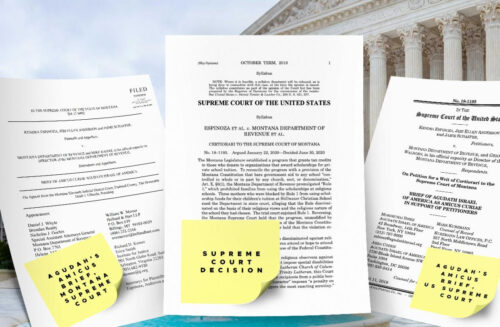 The United States Supreme Court today issued a landmark ruling saying that states may not discriminate against religious schools in state aid programs. This will have a significant positive impact on families choosing to attend religious schools around the country.
The United States Supreme Court today issued a landmark ruling saying that states may not discriminate against religious schools in state aid programs. This will have a significant positive impact on families choosing to attend religious schools around the country.
“Agudath Israel has played a leading role in advocating for programs that make it easier for parents to choose private and religious schools,” said Rabbi A. D. Motzen, Agudath Israel of America’s National Director of State Relations. “Today’s ruling endorses Agudah’s longtime position that states may not bar families from using state aid at the school of their choice simply because they choose a religious option.”
The case, Espinoza v. Montana Department of Revenue, involved a Montana program that provided a tax credit for donations to scholarship funds for students attending private schools. The Montana Department of Revenue ruled that the scholarship could not be used at religious schools, on the grounds that Montana state law prohibited even indirect government aid to religious institutions. The Supreme Court of Montana upheld that position, in spite of Agudath Israel’s brief in that case arguing that states must include religious institutions in public benefit programs under the United States Constitution.
Those supporting the program asked the United States Supreme Court to hear the case, and Agudath Israel of America joined in that effort by submitting an amicus curiae (friend of the court) brief urging the nation’s highest court to hear the case. Agudath Israel’s brief argued that under the Supreme Court’s own precedents, government grant programs may not exclude religious institutions from benefits solely because they are religious institutions.
The Supreme Court agreed to hear the case, and issued its highly anticipated decision today. The Court ruled that the Montana State Constitution discriminated against religious schools and their students solely because of their religious status, and that this constituted a violation of the Free Exercise Clause of the Federal Constitution. The Court held that the Free Exercise Clause “protects religious observers against unequal treatment” and against “laws that impose special disabilities on the basis of religious status.”
Rabbi Chaim Dovid Zwiebel, Executive Vice President of Agudath Israel, hailed the decision. “Agudath Israel has been fighting religious discrimination for decades, and we will continue to do so. We are thrilled that the Supreme Court has made clear that discrimination against religious schools in state aid programs is a constitutional violation. Other states that have ‘no aid’ provisions in their state constitutions, known as ‘Blaine Amendments,’ can now enact programs that encourage or provide assistance to religious school students.”
Agudath Israel thanks Mark Kurzmann, counsel of record on the amicus curiae brief that Agudath Israel submitted to the Supreme Court asking the court to hear this case, and Scott Whitman, a student at Georgetown University Law Center, for his assistance with the research and drafting of that brief. Agudath Israel Vice President for Government Affairs Abba Cohen, and Special Counsel Mordechai Biser, were also named on the brief and participated in the preparation of the brief. Agudath Israel also thanks Jennifer Bordy, a Montana attorney who assisted with the filing of Agudath Israel’s brief in the case before the Montana Supreme Court.


P-L-E-A-S-E, Let’s not allow such success to go to our heads. There is a major difference between a program that will in theory and in theory only benefit yeshivas, and the practical reality of such programs.
The program that was in effect in Montana would have under ideal circumstances provided $150 per family for parents of yeshiva students. After overcoming numerous hurdles both for parents and yeshivas, the MAXIMUM benefit accruing to each family would be the munificent sum of $150 in total for all annual yeshiva costs of all the children in a family.. In light of over $15,000 in average annual tuition costs, this less than 1% assistance is hardly the boon it is touted to be. In fact, it isn’t anything for the Agudah to write home about, or even to write thelakewoodscoop about.
As for the Agudah taking any credit for the Supeme Court decision in the Montana case, really? In Montana? That would be like the Agudah taking credit for D-Day because the Agudas Harabonnim marched on Washington, D.C. in 1943.
Ridiculous.